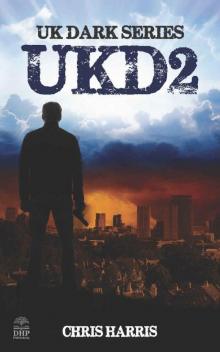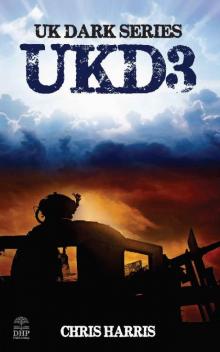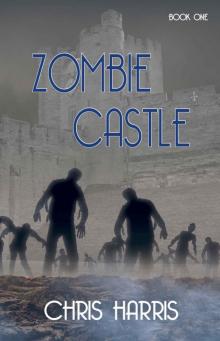- Home
- Chris Harris
Uprising
Uprising Read online
Uprising
Burning Skies
Book 3
Chris Harris
Copyright © Chris Harris 2019
All rights reserved. No part of this publication may be reproduced, stored in or introduced into a retrieval system or transmitted in any form or by any means, electronic, mechanical, photocopying, recording or otherwise without prior written permission from the publisher.
This novel is entirely a work of fiction. Names, characters, places and incidents are either the product of the author’s imagination or are used fictitiously, and any resemblance to any person or persons, living or dead, is entirely coincidental. No affiliation is implied or intended to any organization or recognizable body mentioned within.
Published by Vulpine Press in the United Kingdom in 2019
Cover by Claire Wood
ISBN: 978-1-912701-75-9
www.vulpine-press.com
To my beautiful wife Nicky. Thank you for making the world still turn whilst I’m staring at a screen.
Chapter
One
COBRA, Downing Street, London
Adriene Winslet, the Prime Minister of the United Kingdom, sat stunned into silence. The strain of the last weeks, fighting to hold the country together as it rapidly fell into anarchy, showed on her face.
She had been unable to stop the chaos and was reduced to a spectator as her pleas and broadcasts for calm fell on a nation deafened by panic. The police, despite all leave being cancelled and every available officer being sent to the front line, failed to stop the mass outbreaks of public disorder. Shelves in shops and supermarkets were stripped of all goods; the population had been whirled up into a frenzy by the sensationalist-led media that kept fueling anxiety about how soon everyone would starve as food supplies, not just from the USA, but from other countries stopped flowing into UK ports.
The rioting and looting that followed was, in some cases, caused by people’s desire to gather as much food as possible by all and any means. But mainly by those in society who realized that they had an opportunity to loot, steal, and destroy property with impunity.
The media, even those outlets which had been fierce supporters, turned on her and her party. Predictions of the imminent outbreak of World War Three further fuelled the fires. No matter how many times she reassured the public and the media, both publicly and privately, that they were doing their utmost to resolve the crisis globally and domestically, she just wasn’t believed.
The army had reluctantly—despite protests from every echelon of their hierarchy—been ordered onto the streets to reinforce the dusk-to-dawn curfew that had hurriedly been imposed in an attempt to quell the violence.
The media went apoplectic over this, accusing the government of heavy-handed dictatorial tactics when all the population wanted was to eat. The soldiers, trained for war and not to maintain public order against a population they thought they had enlisted to protect, were not effective anyway and were soon quietly withdrawn following some ugly incidents.
The country needed actions and leadership, but all they had so far from those in power were empty words and promises.
Not that she hadn’t tried. Her first instinct was to rush to her old allies, the United States, for help but the apathy and complete unwillingness to get involved she had experienced from other countries had drained her resolve. Most, she suspected, were working hard in the background to secure their positions in the new world order, whatever that was, when it emerged from the terrible destruction and loss of life that the United States had and still was suffering from.
Only Canada and the old traditional enemy Russia were looking at the other path. Both out of self-interest as they shared long borders, one very suddenly and recently, with an adversary that had proved beyond doubt its capabilities and willingness for ruthless action.
Russia had already unleashed a new and unknown weapon against the attackers besieging Cheyenne Mountain. Reports indicated over seven thousand attacking Chinese troops had been killed by this new and terrifying non-collateral damage weapon.
When she had called the Russian president to protest at the action she was left in no uncertain terms that there was no option of sitting on the fence. You were either with them or against them.
She had let her initial muted promises of support quietly slip away when a phone call from China’s leader himself, spoken through interpreters, had made her baulk at the consequences he promised would follow if any British involvement was detected against the People’s Republic of China.
She justified it to herself that her first priority was to her own people.
Her normally neatly styled hair and manicured image that she portrayed to the public was now ruffled at the edges. Not surprising as the amount of sleep she had been getting since this crisis began could be counted in hours and never more than three in a row.
General Sir Anthony Lloyd, the nation’s chief of the defense staff rushed into the room and whispered into the prime minister’s ear.
“Can you repeat that again, General? So everyone else can hear,” she asked sharply, causing the buzz of noise in the room around her to fall quiet.
The general waited for the last conversations in the room to subside before repeating, “Prime Minister, the Russians and Americans, with the help of Canada, have launched an attack on US soil.”
He looked with distain at the prime minister. “Whilst we have sat here, wringing our hands, unable to make a decision for fear of upsetting China, who we all know have committed the biggest act of international piracy ever committed, other countries who can see the bigger picture have chosen to act and not waste time on yellow-livered words of surrender.”
Adriene Winslet stood up quickly, real anger showing on her face for the first time, her chair toppling over behind her. “Now look here, General, remember who you are addressing.”
The general was sick to his back teeth of the complete lack of progress the cabinet had made since the crisis started. He had been present at all the COBRA meetings where no will at all had ever been expressed to stand up the international bully and nation stealer that China had turned into.
He could see where this would lead, whereas all the political appointees around the table could only see mediation, reconciliation, and compromise as the way forward.
History, of which he was a student, showed that time and time again nation states who chose the course of action that China had commenced would not stop at just the one victory. One was never enough and whilst their politicians, ambassadors, and emissaries all spread words of peace, rebuilding, and reconciliation, the warmongers and those who pulled the strings in the background would be planning the next move.
One conquest would never be enough.
If China could consolidate their rule and iron grip across what was the most powerful and richest nation on earth in a few short weeks, then no one could stand in their way.
He banged his fist as hard as he could on the table. A crystal decanter toppled over, spilling water across the files and papers scattered across the large polished oak table.
“Ma’am, I think you should also remember who you are addressing. The British Armed Forces are led by the Queen.”
He paused and looked around the table before looking the prime minister straight in the eye.
“But as we all know, as a constitutional monarch she follows the laws and legislations passed by the government in power. Now I can be replaced, and you can find another of my colleagues who may be willing to sit idly by whilst all advice offered is ignored…But as I can be replaced, so can you.”
He let that statement settle over the room.
A few looked shocked and worried at the thought of losing positions that had taken a lifetime of work to attain. A few others could
not help themselves but glanced at the prime minister, seeing how vulnerable she was and imagining themselves taking over the role.
Having worked up through the ranks of the party herself and knowing how much she had coveted the position, she recognized the few glances thrown in her direction. One vote of ‘no confidence’ would end her career.
She had fought long and hard to get where she was. Being politically intelligent and shrewd she realized immediately that the next few minutes could be the making, or the ending, of her political life.
After taking a moment to compose herself, she asked the question, “General, you have our attention. Now what do you suggest we do?”
Chapter
Two
San Antonio, Texas
General Liu followed the United States Marine Sergeant, still trying to comprehend that he was not his trusted aide Sergeant Huang, but an enemy spy. A spy who nevertheless had just saved him from a firing squad. He followed him silently as the two of them ran through the basement and service areas of the hotel that he had been imprisoned in by Agent Fen Shu following his arrest the day before.
“Where are you taking me, Hua—?” He stopped himself before he called his savior by his pseudonym as he paused at a corner. The sergeant checked the way ahead was clear then waved him on.
“Sir, I am taking you out of the city. After that I have no more information.”
Liu nodded and asked no more questions. His mind was too busy trying to compute the last five minutes of his life to go through the many permutations of what may lie ahead.
He was officially an enemy of his beloved homeland. Sentenced to death for crimes against the state. He knew the allegations made against him were false. Made up by Fen Shu after he continually criticized her badly thought-out and executed plan to invade and control the US.
He knew if victory was to be claimed, the only way it could be achieved would be by winning over the local population, not by force and intimidation, but through hearts and minds.
Most of the citizens of the United States had been under the impression that the Chinese had arrived to render assistance following crippling attacks by an unknown party. That lie was seen through the moment the camps were set up and tens of thousands were herded into them and forced to live in squalid conditions, not as grateful survivors, but as prisoners.
Word soon spread, and the beginnings of a resistance began.
He’d tried to tell her that the camps were strategic mistakes taking up valuable resources and manpower. Resources that anyone as well versed as he was in military planning would know would be better used in securing the victory that was tenuously within reach.
Hundreds of thousands of Chinese soldiers were already on American soil, the first wave having parachuted in to secure the airfields ready for the second wave. The bulk of the follow-up forces landed by ship and spread across the country to their designated positions.
More were arriving every day as the transport planes continued to ferry the remaining troops from the staging areas of Cuba and Venezuela. The second, huge wave of thousands more troops and their associated equipment was currently steaming across the Pacific in the bulk of the Chinese Navy’s remaining ships, awaiting final orders as to where to land.
Hundreds of thousands of troops had landed and hundreds of thousands more were arriving imminently, but still Liu criticized the plans.
Against any other country the plan would work by sheer weight of numbers alone. The United States had suffered horrifically from the twelve nuclear detonations over major population centers and strategic targets.
Millions had died instantly in the explosions and blast waves, and millions more were condemned to a slow lingering death caused by radiation poisoning.
The United States, though, had a population of over three hundred and twenty million. It was hurt and hurt badly, but the vastness of the country meant that some entire states had only seen small detachments of Chinese soldiers.
Those giants, containing millions of citizens from one of the most heavily armed countries in the world, could have been kept as sleeping giants—controlled, or at the very least mollified, by carefully controlled media broadcasts and a complete blackout of any others news coming in.
Liu knew that was not the case.
Fen Shu had naively planned that the whole American population would be so cowed and grateful at their arrival that they could soon subjugate and control, using a variety of methods, the whole population.
Her experience, though, came from controlling the uncountable millions of peasants who made up the bulk of the Chinese workforce. For hundreds, if not thousands of years and long before the Communists took control of the vast nation, the Chinese peasants had been controlled and dominated by successive emperors and warlords. Free will and freethinking had been virtually erased from their genetic makeup and any expression of it was immediately erased with maximum force and aggression.
America, however, was built on different foundations. Its strength came from its people. A people who not many generations before had carved, tamed, and created the country using their will power, endurance, and strength. Yes, they had laws and regulations to follow, but freedom was at the heart of the ethos most of them lived by.
Liu knew that if they realized the freedom they cherished so greatly was being taken away from them before the Chinese Army could consolidate its hold over the entire country and its strategic assets, they would be in trouble. The spark of rebellion would turn into a flame and that flame would start a wildfire that would be unstoppable.
Liu then found out that the illness that had started in the camps and spread through the local population was a biological weapon released by Fen Shu. Blankets laced with a virus had been handed out at all the aid stations set up as part of their supposed relief effort. This was her brilliant plan to persuade the captured president of the United States to surrender the country to the invaders with the promise of releasing the cure.
It was also intended to control more of the population. If they are sick, they cannot fight you, was the reasoning. And when the cure was released they would be too grateful to remember who it was in the first place who released the virus.
He knew that millions more would die, and her reasoning was completely flawed.
He personally had undertaken in-depth research to understand the minds of one his country’s greatest enemies and understood what needed to be done.
Fen Shu hadn’t, and in her arrogance had destined the whole mission, in his opinion, to potentially fail.
His mind was racing so much he ran into the back of his savior when he stopped at a door.
“Wait here,” hissed the sergeant as he went through the door and closed it behind him.
Liu, blinking in the bright light that flooded through the briefly opened door, waited, shivering in his bare feet and thin shirt.
The door opened, and his former aide bustled through holding a bag in his hands. “Put these on please, sir,” he said politely
Liu looked at him briefly, his face asking the question.
“It is your uniform, sir. You may have lost one when you were arrested, but I retrieved another from your quarters.”
He held up the jacket, resplendent with rows of medals and ribbons.
“Quickly please, sir, we must get you out of the city.”
Liu stood for a moment and stared at his savior. He was receiving orders from a subordinate. Not twenty-four hours before, whoever had the audacity and stupidity to do such a thing, no matter how correct he or she was, would have been punished severely.
Now he obeyed. Realizing as he did so, struggling with the buttons, that this was the first time in many years he had not dressed without the help of a valet.
His persona changed as he fastened the last button. Removing his uniform and the identity that went with it was an age-old tactic used to control the one you wanted to assume power over.
Now he had his identity back. He was once more a general in
the army of the People’s Republic of China.
The marine sergeant noticed his change in poise. “Yes, sir. That’s more like it. We are relying on you to get us through all the roadblocks and out of the city before it’s too late.”
He nodded, assuming that by ‘too late,’ he meant his escape had been noticed. The sergeant knew otherwise, but now was not the time to tell him what was about to happen.
Exiting the hotel, he was surprised to see his official car with his nation’s flag attached to the hood fluttering in the wind that whipped through the narrow alleyway.
In minutes he was speeding through the city. No soldier at any roadblock or checkpoint had the nerve to even think of stopping the progress of the VIP obscured from view behind the deeply tinted windows of the official-looking car.
Chapter
Three
Somewhere on the I-64, Virginia
Cal and the twenty-four other passengers stood staring at the sky. Only moments before they had been on the bus that was conveying them to a ship due to repatriate them back to their own countries and away from the war zone they had unexpectedly found themselves in.
From different European countries, as was the usual, the shared common language was English, which they all spoke with greater or lesser degrees of fluency.
This suited Cal fine, as his, along with most of the British population’s foreign language skills, had not developed beyond being able to order a drink at a bar in whatever your European holiday destination was that year.
Most of his fellow passengers did not know what the high-up chemtrails meant. He did. He was also party to other information that he knew his travelling companions were in ignorance of.
The chatter between them began. Cal needed to stop it before wild speculation and hysteria caused the panic and poor decisions that would follow.

 Dark Days: A Collection of Short Stories and Poetry
Dark Days: A Collection of Short Stories and Poetry_preview.jpg) Emergence (Unedited Edition)
Emergence (Unedited Edition) Uprising
Uprising UKD2: UK Dark Series Book 2
UKD2: UK Dark Series Book 2 UKD3: UK Dark Series Book 3
UKD3: UK Dark Series Book 3 Zombie Castle (Book 1)
Zombie Castle (Book 1)